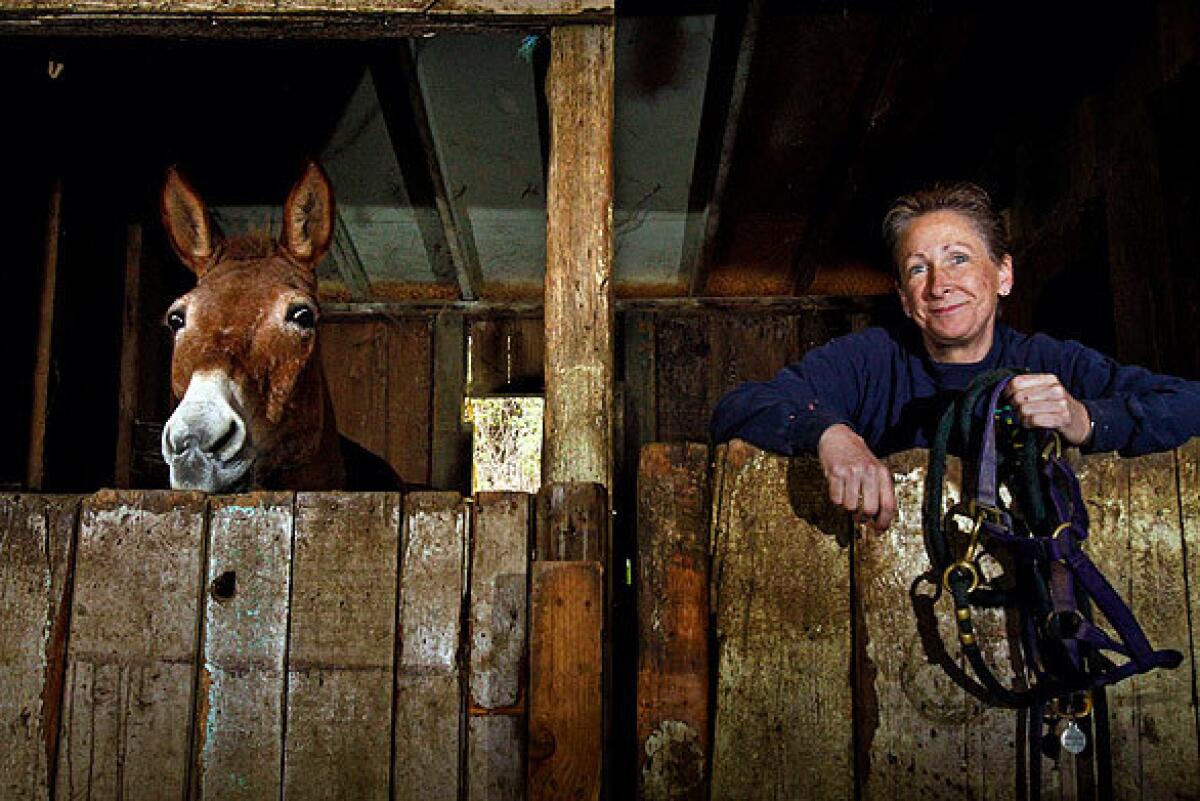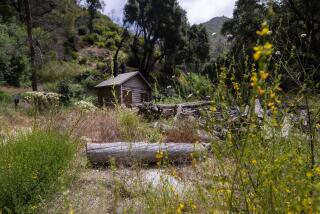In San Gabriels, thinking of packing it in

See full story
- Share via
It felt like a secret -- an oasis hidden at the end of a twisting, dusty road where city life evaporated in the cool, mountain breeze.
Deb Burgess fell hard for the sprawling San Gabriel Mountains wilderness etched with hiking trails and burbling streams, and couldn’t resist buying one of the area’s vacation cabins in 2001. Later, when the opportunity arose to run the entire place, she counted herself lucky. It seemed a romantic existence: managing the general store, organizing overnight stays at the campgrounds, delivering goods on the bristly backs of donkeys and becoming embedded in the area’s history.
But operating Adams’ Pack Station in Chantry Flat, a piece of nostalgia in the Angeles National Forest, has nearly extinguished the spirit that brought her here in the first place.
Mudslides, she knew, were always possible. Forest fires, too. And the economics of hauling in supplies at 50 cents a pound on donkeys to cabin owners in the canyon would be marginal, at best. But when the Los Angeles County Health Department told her the cold drinks, hot dogs and “Kick-Ass Burgers” she sold from the front porch of her modest general store might have to go, she wondered -- again -- whether it was time to pack it in.
::
Burgess and her mother, Sue, bought the pack station in 2006 on April Fool’s Day. The one-acre spread came with a small barn, a corral, a two-bedroom cabin and donkeys suitable for packing -- an old-school practice in which animals deliver cargo. The seller had gone through her entire savings of $50,000 attempting to stay afloat. The buyers figured it was just bad luck and believed they could invigorate the business by hosting corporate retreats at the Sturtevant Falls campgrounds.
They also thought they could restore the neighborhood feel created by Bill and Lila Adams, who had taken over the station in the 1940s, a decade after it opened. For more than 35 years, Bill did the packing while his wife tended store.
“We had a little Coke stand on the porch and got to know all the cabin owners as friends,” recalled Lila Adams, 91, who now lives in Oklahoma. “They would sit there for a little while and I’d get them a cup of coffee, and we had picnics for them. For people who were hiking from out of town, I would give them pine cones I had collected. We were just a jolly couple, and I think that’s what people remember.”
Open Friday through Sunday, the station coordinates rescues and serves as an informational center, selling maps and national forest Adventure Passes, but Burgess quickly discovered how difficult the packing life could be. Owners of the 80 historic cabins in the area relied on her and the donkeys to deliver cans of paint, propane tanks, generators and food over roads not drivable.
In her third week, she was leading a herd of donkeys down a mountain road when one slipped over the edge, pulling her and the rest of the team into a ravine 75 feet below. Search-and-rescue teams responded. A couple of animals suffered broken bones, but Burgess made it out with bruises and scrapes.
Twice she has had to evacuate the animals when fire threatened the forest. The Santa Anita racetrack took them in, free of charge, but fire and mudslide seasons bring constant worry.
Packing brings in from $10 to $400 a day, but it’s only done twice a week and rarely earns enough to pay the $1,100-a-month feed bill, not to mention vet bills and payroll. Burgess still cannot afford to quit her full-time job as a business analyst.
At first, her mother lived at the pack station while Burgess commuted from her Lakewood home. After emptying her 401(k) and bank accounts, Burgess mortgaged her home to pay the pack station’s overhead. When the recession hit, she ended up underwater on her house and put it up for rent. She moved into the pack station’s cabin in December. Her mother, weary of such a public life and of a raft of U.S. Forest Service regulations on things such as planting a garden, moved out.
But the station started breaking even when it began offering hot dogs, hamburgers and pulled pork sandwiches at its general store. It was already a place to buy a cold drink and a candy bar, but warm meals brought in a crowd of famished, weary hikers in search of shade and a couple of chilled beers. Families enjoyed socializing on the porch and grabbing an ice cream treat for dessert.
Last month, the county Health Department said the general store had to come up to code or cease selling food and drinks.
The store -- consisting of a cash register set on a table, a refrigerator and a freezer -- is on the deck of the two-bedroom cabin where Burgess lives with her 18-year-old son, Jason. Because the business is attached to a private home, the county ordered a strict division between the two. Food couldn’t be cooked at the store unless it had an outdoor mop sink and hand sink, despite the fact that the cabin’s kitchen sink was only 10 feet away.
After a recent on-site visit, the county dropped some of its demands, citing the historic nature of the station. Still, Burgess estimates she’ll be left with a $7,500 tab for required changes and is planning a fundraiser for April 24 to pay for improvements such as fortifying an indoor food closet, dry-walling the storage area and installing fluorescent lighting.
The brush with bureaucracy also pushed Burgess to the brink of selling. “What kind of nut-job buys a business and puts everything she can into it?” she wrote in an e-mail to the previous owner.
::
In spite of the struggles, cabin owners and frequent visitors say the pack station has been transformed. “This is probably the best ownership we’ve ever had except way back in the older days,” said Steve Burns, 58, whose cabin is three miles from Chantry Flat. “She’s doing exceptionally well. It’s just been really nice and homey.”
Part of the atmosphere is thanks to Rich Conforti, Burgess’ ex-husband, who built the store’s porch and is known for walking around the premises with a cup of coffee and greeting visitors. The two divorced when Jason was young, but remain close. With his girlfriend, Conforti, 57, spends every weekend at the station.
One recent Saturday morning, Burgess began the nine-mile trek down a narrow forest path with donkeys in tow.
“You know, it was an emotional decision,” she said, waving back at the station. “I mean, look how beautiful this is. You couldn’t ask for more. But every time you turn around, it’s something else. . . . Last summer was good, though -- not financially, but the kitchen was busy and people were hanging out on the deck. I want to be able to see that again.”
Nudging the herd along, she continued walking through the shade amid a chorus of gurgling creeks and rushing waterfalls -- the very details that drew her to the place years ago.
More to Read
Sign up for Essential California
The most important California stories and recommendations in your inbox every morning.
You may occasionally receive promotional content from the Los Angeles Times.














